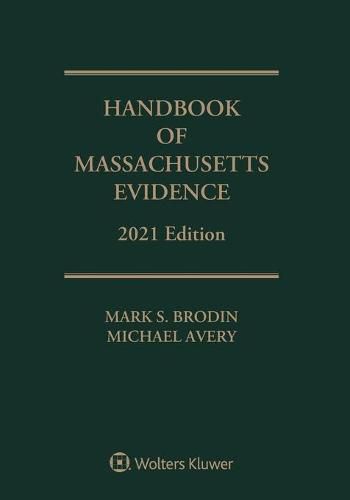Readings Newsletter
Become a Readings Member to make your shopping experience even easier.
Sign in or sign up for free!
You’re not far away from qualifying for FREE standard shipping within Australia
You’ve qualified for FREE standard shipping within Australia
The cart is loading…






The Handbook of Massachusetts Evidence is a comprehensive and practical guide to the law of evidence in Massachusetts. Providing clear explanations of the settled law and expert advice on more complicated evidentiary problems, this one-volume compendium provides in-depth coverage of everything attorneys need for analyzing and weighing evidence, planning litigation strategy, and justifying objections. It is an invaluable aid in determining the use and admissibility of evidence in Massachusetts courts.
The 2021 Edition brings you up to date on the latest new cases, statutes, and developments, including these:
For a hearsay statement to be admitted under the doctrine of verbal completeness, the proponent must show that the additional statements are (1) on the same subject as the admitted statement; (2) part of the same conversation as the admitted statement; and (3) necessary to the understanding of the admitted statement.
The Court has similarly advised that, where a defendant is entitled to the services of a translator because of an inability to speak English, or the defendant’s inability to speak English is likely to become known to the jury, the better practice is for the trial judge to inquire, upon defendant’s request, whether any prospective juror harbored bias against non-English speakers. Where the entire jury has been exposed to extraneous material, the judge is required to conduct individual voir dire to determine whether the jurors can remain impartial. For revocation of a juvenile’s pretrial probation based on a new criminal offense, the Commonwealth must prove there is probable cause to believe the juvenile committed the offense; for revocation based on violation of a condition, proof must be by preponderance of the evidence. Evidence detailing a criminal investigation is generally not allowed as it usually has no relevance to whether the defendant in fact committed the acts charged, and it may appear as an imprimatur of official belief in defendant’s guilt. Where an agency’s own duly adopted regulations require disclosure, disclosure is required notwithstanding any exemption in GL 4, 7 that might apply. The Supreme Judicial Court has emphasized that the constitutional issue in identification cases is not whether the witness was or might be mistaken but whether any possible mistake was or would be the product of improper suggestions made by the police.
Under Massachusetts law, an out-of-court identification may also be suppressed if it violates common-law principles of fairness. A judge may suppress an identification if it resulted from a highly or especially suggestive confrontation with the defendant, even though not brought about by the police, or if it is so unreliable that the danger of unfair prejudice substantially outweighs its probative value.
Previous Edition: Handbook of Massachusetts Evidence, 2020 Edition, ISBN 9781543810516
$9.00 standard shipping within Australia
FREE standard shipping within Australia for orders over $100.00
Express & International shipping calculated at checkout
The Handbook of Massachusetts Evidence is a comprehensive and practical guide to the law of evidence in Massachusetts. Providing clear explanations of the settled law and expert advice on more complicated evidentiary problems, this one-volume compendium provides in-depth coverage of everything attorneys need for analyzing and weighing evidence, planning litigation strategy, and justifying objections. It is an invaluable aid in determining the use and admissibility of evidence in Massachusetts courts.
The 2021 Edition brings you up to date on the latest new cases, statutes, and developments, including these:
For a hearsay statement to be admitted under the doctrine of verbal completeness, the proponent must show that the additional statements are (1) on the same subject as the admitted statement; (2) part of the same conversation as the admitted statement; and (3) necessary to the understanding of the admitted statement.
The Court has similarly advised that, where a defendant is entitled to the services of a translator because of an inability to speak English, or the defendant’s inability to speak English is likely to become known to the jury, the better practice is for the trial judge to inquire, upon defendant’s request, whether any prospective juror harbored bias against non-English speakers. Where the entire jury has been exposed to extraneous material, the judge is required to conduct individual voir dire to determine whether the jurors can remain impartial. For revocation of a juvenile’s pretrial probation based on a new criminal offense, the Commonwealth must prove there is probable cause to believe the juvenile committed the offense; for revocation based on violation of a condition, proof must be by preponderance of the evidence. Evidence detailing a criminal investigation is generally not allowed as it usually has no relevance to whether the defendant in fact committed the acts charged, and it may appear as an imprimatur of official belief in defendant’s guilt. Where an agency’s own duly adopted regulations require disclosure, disclosure is required notwithstanding any exemption in GL 4, 7 that might apply. The Supreme Judicial Court has emphasized that the constitutional issue in identification cases is not whether the witness was or might be mistaken but whether any possible mistake was or would be the product of improper suggestions made by the police.
Under Massachusetts law, an out-of-court identification may also be suppressed if it violates common-law principles of fairness. A judge may suppress an identification if it resulted from a highly or especially suggestive confrontation with the defendant, even though not brought about by the police, or if it is so unreliable that the danger of unfair prejudice substantially outweighs its probative value.
Previous Edition: Handbook of Massachusetts Evidence, 2020 Edition, ISBN 9781543810516